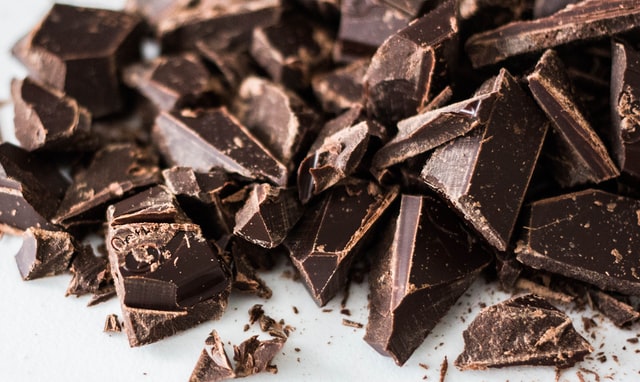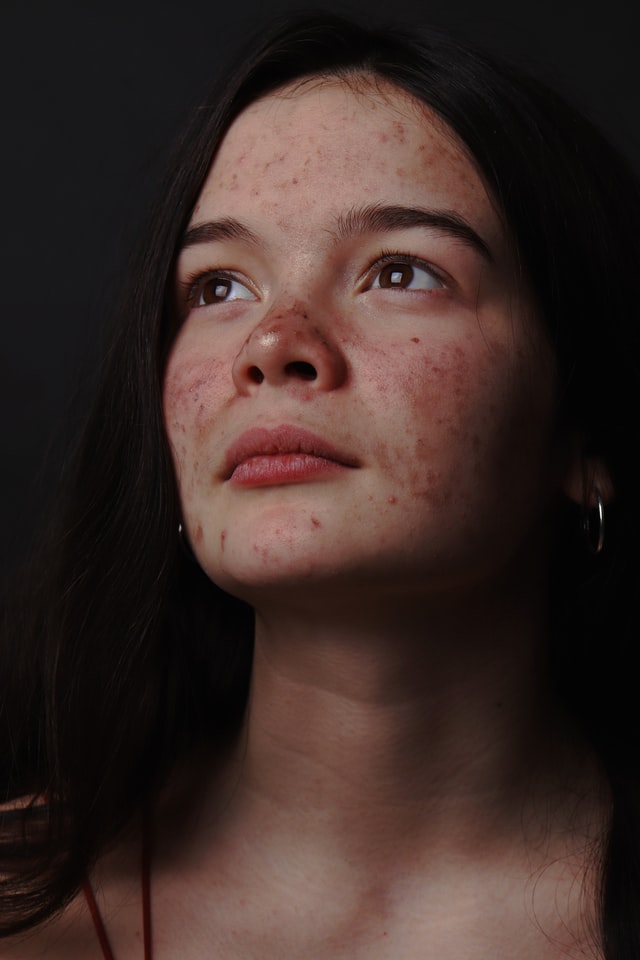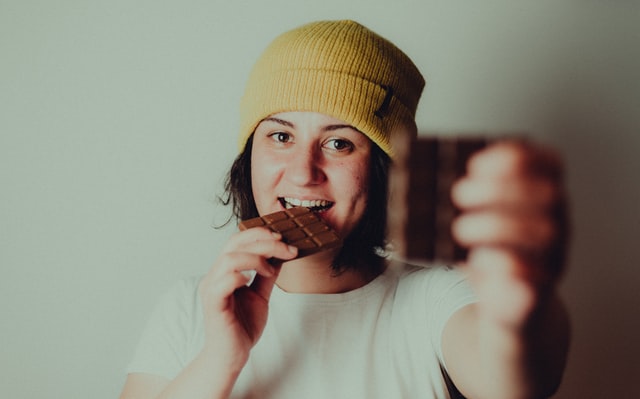Is Chocolate Bad for your Skin?
As a child, you were likely warned that eating chocolate causes spots and pimples. Now as an adult you probably want to know whether this is actually true. In this article we will explore various claims surrounding chocolate consumption and acne development, and answer the question – is chocolate really bad for your skin?
DOES CHOCOLATE CAUSE ACNE?
Acne-Genic Foods:
When it comes to diet, there is some data to suggest that high glycemic index foods (i.e. rich in refined carbohydrates and sugar) are bad for acne-prone skin. These foods cause a spike in blood sugar which increases the production of insulin alongside hormones known as androgens. A rise in androgens is particularly bad news for already acne-prone skin as these hormones increase the amount of sebum – an oily substance secreted by the sebaceous glands. When too much sebum is produced, it can combine with dead skin cells and become trapped within pores, annoyingly leading to blackheads, whiteheads and pimples!
The Link between Cocoa and Pimples:
With regards to chocolate specifically, a 1969 study appeared to show that there was no evidence relating to a link between increased chocolate consumption and acne development. However, this investigation has recently received criticism and accusations of bias as it was no other than the ‘Chocolate Manufacturers’ Association of the United States of America’ that was found to be a key supporter in the investigation.
In a more recent 2016 study, participants were randomly assigned to either a chocolate bar or jelly bean group – both of which shared the same glycemic load. Interestingly, those in the chocolate-consumption group had significantly more acne lesions than those in the jellybean consumption group, indicating a potential relationship between pimples and chocolate.
On a similar note, a study presented to the American Academy of Dermatology, focused solely on pure cocoa (excluding other ingredients such as sugar). Findings suggest that pure cocoa consumption did exacerbate acne in participants who already possessed a history of the condition in the past. However, with that being said, the study did have limitations as only 10 subjects were investigated and all of them were men between the ages of 18 and 35.
IS THERE MORE BAD NEWS FOR CHOCOHOLICS?
Unfortunately, yes. The bad news for chocolate lovers doesn’t stop there. While robust and properly-researched evidence is still somewhat lacking in this field, experts believe that chocolate bars and the sugar within them can potentially lead to skin ageing.
Accelerated Aging:
When your body breaks down sugars, they enter your bloodstream and move into your cells, where they are converted to energy. If there is too much sugar in the blood, or, if the blood sugar level is constantly elevated, the sugar molecules can stick together and bond to collagen in a process of glycation. This results in the damage of both collagen and elastin in your skin, subsequently leading to a loss of elasticity, firmness and the acceleration of ageing.
In addition to this, glycation can also aggravate pre-existing skin conditions such as rosacea and acne (another implication to the role of chocolate in giving you spots!). If excessive sugar consumption is frequently adopted, then the body is forced to produce higher levels of insulin. This increases the risk of developing insulin resistance which means that more insulin needs to be produced to balance out the sugar spikes. As mentioned earlier, this is not so good for the skin, as more insulin equals more pimples!
BUT IS THERE ANY GOOD NEWS?!
Fortunately, dark chocolate (i.e. chocolate with a cocoa percentage of 70% or more) has been noted to be wonderfully healthy with scientific evidence to suggest that it has a number of benefits for the skin. This should make you feel less guilty for indulging in your favourite sweet treats!
Protection Against Sun UV Rays:
Cocoa and chocolate contain antioxidant compounds called flavanols. Research has suggested that flavanols play a role in preventing skin damage by protecting the skin from UV rays. One study, in particular, found that the regular consumption of chocolate rich in flavanols conferred significant photoprotective effects. However, in opposition, another study has shown that there are no statistically significant protective effects between high-flavanol chocolates and low-flavanol chocolates. As such, conflicting conclusions such as these mean that you shouldn’t be trading the SPF for a chocolate bar just yet.
Increases Skin Elasticity:
Flavanols have also been demonstrated to have a positive influence on skin elasticity. In one such study, oral supplementations of cocoa flavanols were given to female participants with visible facial wrinkles. Results at the end of the experiment found that those who consumed the supplements had improved wrinkle severity and skin elasticity over the course of 24 weeks. As a result, this hints that high-flavanol chocolates may be a promising strategy for the prevention of skin photo-ageing. But, with that in mind, it should also be said that most antioxidants in cocoa are lost in the chocolate-making process. However, many manufacturers are now experimenting with new processes which may help retain as much goodness as possible – so there is hope for the future!
SO, CAN I CONTINUE TO EAT CHOCOLATE?
Yes, of course, you can! But, like all treats, it should only be in moderation. For those with existing acne-prone skin, ideally, seek out darker chocolates with less fat and sugar. With the Halloween and holiday season coming up, it may also be a good idea not to binge on these sweet confections all in one day – instead, spread them out sensibly. This will allow your body to process the sugars more gradually and hopefully help to keep your skin pimple-free!
However, if any concerning skin-related symptoms persist or arise, we highly encourage you to seek professional help for closer examination. Here at First Derm, we offer a fast and secure service with online board-certified dermatologists (skin doctors) ready to take a look at your skin concerns. Simply upload an image anonymously and we’ll get back to you within a matter of days.
About the Author:
My name is Rain Speake, a BSc Human Biology and MSc Healthcare Technology graduate from the University of Birmingham. I have an interest in skincare and dermatology and have previously undertaken research on the formulation of an anti-scarring spray for oral delivery. Beyond the lab, I enjoy keeping up to date with emerging scientific trends and communicating health-related topics to the public.
Sources:
- https://jamanetwork.com/journals/jama/article-abstract/350738
- https://www.jaad.org/article/S0190-9622(16)01395-5/pdf
- https://pubmed.ncbi.nlm.nih.gov/21920227/
- https://pubmed.ncbi.nlm.nih.gov/24970388/
- https://pubmed.ncbi.nlm.nih.gov/19735513/
- https://academic.oup.com/jn/article/146/1/46/4585665
Image Courtesy:
- Photo by Charisse Kenion on Unsplash
- Photo by Megan Bagshaw on Unsplash
- Photo by Tamas Pap on Unsplash
Ask a Dermatologist
Anonymous, fast and secure!

The Specialist doctor from the University Hospital in Gothenburg, alumnus UC Berkeley. My doctoral dissertation is about Digital Health and I have published 5 scientific articles in teledermatology and artificial intelligence and others.




